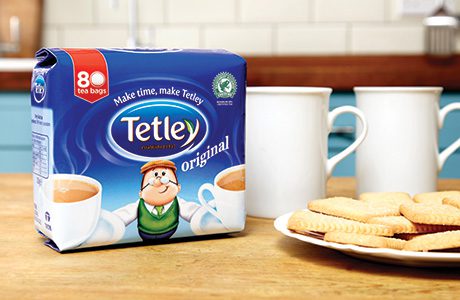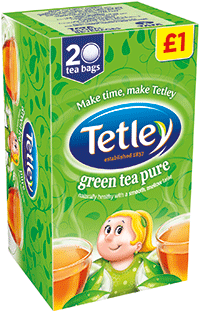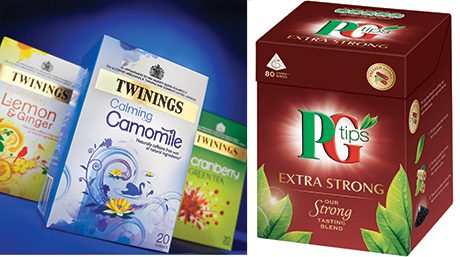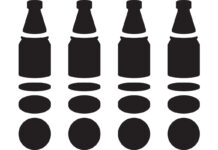TEA is a long-established favourite in British homes. That’s as true in Scotland as elsewhere in the UK, although there are some differences, particularly in brand preferences. But sales of mainstream black tea, though still massive, are in decline while sales of some other, more specialist, types of tea are growing.

As top-up shopping at c-stores increases, convenience retailers may have to think more carefully about their tea stocking policies and carry a wider variety of tea styles and pack sizes.
In mainstream tea Scotland differs from GB overall in one very important characteristic. While PG Tips is the GB brand leader it’s Tetley Tea that is by far the biggest-selling tea north of the border.
And Andrew Pearl, director of customer and shopper marketing for Tetley was able to sum up the overall trends in the tea market.
“Tea continues to be an everyday essential buy and the beverage of choice for consumption out of home,” he said. “But despite this, competition from within the tea sector and other hot beverage areas has led to an overall decline in tea sales.
“The decline has been driven by a fall in everyday black tea sales with volume sales down 9.2% in the total market, 10.0% in convenience and 10.8% in Scotland. However there are areas of growth in the tea market that are attracting shopper interest and sales in these segments are increasing year on year.”
Those areas include premium teas, flavoured teas and tisanes, green teas and teas that are often considered healthier than regular tea.
That being said, everyday black tea still accounts for the majority of tea sales. Tetley says shoppers expect to see familiar brands. Quoting Nielsen to 3 January this year the firm says the top selling tea brands in Scotland are: Tetley with 47% of sales value, PG with 6%, and Yorkshire Tea with 5%.
And Pearl argued that it’s important that retailers continue to highlight the mainstream big sellers. “Make sure that your customers can see that you are stocking the brands they are looking for by blocking them together,” Pearl said.
But retailers should consider other teas, he added. “Sales of premium teas have been growing for some time, up 8.5% by value in convenience overall and up 11% in Scotland.”
He identified two key types of specialist tea that he reckons could provide extra sales – premium teas such as Earl Grey and English breakfast, and healthier teas, like green, fruit, herbal and decaffeinated lines.
“Sales of premium teas have been growing for some time now, up 8.5% by value in convenience overall and up 11% in Scotland, Pearl said.
For the retailer they offer higher margins, he added. Tetley has brought three of its premium teas together under The Blend Collection: Tetley Extra Strong; Tetley Blend of Both, blended with green tea and Tetley Original tea; and Tetley Kenyan Gold, made with tea hand-picked at high altitude.
 In healthier teas the brand team says Tetley Green Pure and Tetley Green Lemon are big sellers and the availability of packs of 20, price marked at £1.00, encourages shoppers to buy.
In healthier teas the brand team says Tetley Green Pure and Tetley Green Lemon are big sellers and the availability of packs of 20, price marked at £1.00, encourages shoppers to buy.
l his time last year Unilever launched a new range of fruit and herbal, and green teas under the PG tips brand.
Around half of sales from the new PG tips lines are incremental to total tea sales, the firm says.
Lola Danlos, brand manager for PG Tips at Unilever UK, said: “The fruit and herbal, and green tea sectors are driving the UK hot beverages market, with an increase in value growth over the last year of 11.3% for fruit and herbal and 18.9% for green.
“Our aim is to drive incremental sales within both the fruit and herbal, and green sectors by catering for consumers looking for a fresh, flavoursome taste at an accessible price point.”
l ob Brazier, customer business director at Twinings, also sees specialist teas as growing in a tough market.
“Convenience categories such as biscuits and meal solutions are seeing a trend towards premiumisation and healthier options. Shoppers within the tea category are also reflecting this behaviour.
“Although mainstream tea remains at the root of sales, delivering over 90% of category value within the last 12 months in convenience, it has experienced over 9% decline whilst sub-sectors such as special tea have seen over 6% growth.”
Quoting Nielsen statistics for sales in impulse outlets for the year to mid-June last year he said: “Green tea sales are being driven by brands which shoppers are familiar with and have tasted before. The Twinings green tea range has delivered over 5% value growth in the last year and secured over half of all category sales.
“Flavoured green teas are showing even stronger growth at 9%. Again this is driven though premium branded SKU’s such as Twinings Green and Lemon 20s.”























